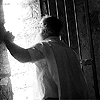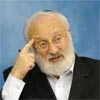What to Ask for At a Kabbalist’s Grave
 Questions I received on whether one should visit the graves of the righteous, and what to ask for at these sites:
Questions I received on whether one should visit the graves of the righteous, and what to ask for at these sites:
Question: I want to visit the graves of the righteous on Mount Miron. The trip I’m interested in going on will be held at night, and the trip’s organizer said that according to Kabbalah, you can use the moon’s cycle to calculate what is the best time to ask to be cured from illness. However, I also heard another opinion from someone who studies Kabbalah – he said that this shouldn’t be done. I would like to find out whether it can be done, and why at night?
My Answer: No one ever visits graves at night. The one exception is the night of Lag BaOmer, when people light bonfires all over Israel, including Mount Miron, by the grave of Rashbi, the author of The Book of Zohar. This is an ancient custom. However, asking to be cured from illness when there is a full moon has nothing to do with Kabbalah, but only with mysticism and shamanism.
Rabash and I used to go to Tiberius for two days out of the week, and sometimes we visited the grave of Rashbi on Mount Miron. Rabash respected that place. However, he didn’t see it as a place to ask for people’s corporeal, egoistic problems to be solved, such as healing, but rather only as a place to ask for similarity to the Creator. When one is there, he should ask for the ability to love his neighbor, instead of being concerned with one’s animate body, with healing it, or other benefits.
By definition, Kabbalah is the method of revealing the Creator (the property of love and bestowal) to a person in this world (in this life). Kabbalah bears no relation to receiving something for oneself. (See the definition in the article “The Essence of the Wisdom of Kabbalah.”)
Between the years 1979 and 1991, when I knew Rabash, he visited the Wailing Wall only once – in 1983. He just walked past the wall, at least 2-3 meters away from it, and didn’t even come close to it, not to mention touching it. He visited the grave of the Ari once in ten years.
Baal HaSulam once said that he really doesn’t care where they’ll bury the bag with his bones. When he passed away and his students didn’t know where to bury him, one student remembered that Baal HaSulam used to like walking on a specific hill, and that’s where they buried him.
Once I asked Rabash for permission to fix up Baal HaSulam’s grave – to whiten it, make a place for candles, and so on. Rabash told me to leave this to others, because there were more important things to do. Rabash also didn’t prepare a burial place for himself, even though it’s a custom among the religious. (In the past bodies weren’t buried, but locked in a cave that was dug for this purpose. They were left there for some time, and when only the bones remained, they were placed into a vessel.)
Kabbalists do not respect anything corporeal. Every person respects what is important to him, and what he is attached to – the body or the soul. To a Kabbalist, the body is intended to do work, just like an animal (for example, cattle). All his attention is focused on developing the soul – the part of the Creator in man, the property of love and bestowal.
Question: Rashbi is buried on Mount Miron, and thousands of people visit his grave every year. Is this something the Creator instructed them to do, or do these instructions come from religious leaders who want to influence people and have power over them?
My Answer: Kabbalah favors this custom, because it brings people closer to Kabbalah, making them respect it and become interested in it.
Related Material:
Laitman.com Post: Only the Upper Light Can Change Our Destiny
Laitman.com Post: Love Thy Neighbor as Thyself
Laitman.com Post: Always With Me
Laitman.com Post: Corporeality Has No Effect On Spirituality
Baal HaSulam Article: The Essence of the Wisdom of Kabbalah







